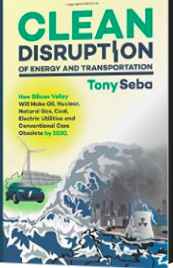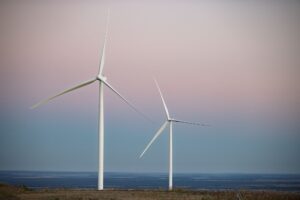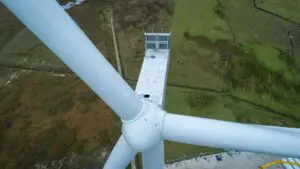Last year, in an interview with Stanford University’s Tony Seba, we foreshadowed the remarkable conclusions of his new book: that energy and transportation as we know it will be history by 2030.
That book, the Clean Disruption of Energy and Transportation, is now published, and it has even more dramatic prognosis: Silicon Valley will make oil, nuclear, natural gas, coal, electric utilities and conventional cars obsolete by 2030. And Australia – with its high solar penetration – will lead the way be the shape of things to come.
is now published, and it has even more dramatic prognosis: Silicon Valley will make oil, nuclear, natural gas, coal, electric utilities and conventional cars obsolete by 2030. And Australia – with its high solar penetration – will lead the way be the shape of things to come.
What’s more, Seba says it might happen even earlier than 2030.
He’s not the only person to predict this transformation. Jeremy Grantham agrees, and many in the utilities industry see the same risks. Paul Gilding has made similar predictions.
“Clean energy (solar and wind) is free,” Seba writes. “Clean transportation is electric and uses clean energy derived from the sun and wind. The key to the disruption of energy lies in the exponential cost and performance improvement of technologies that convert, manage, store, and share clean energy. The clean disruption is also about software and business model innovation.”
Seba says the energy architecture of the future will be completely different from the one today.It will be distributed, mobile, intelligent, and participatory and will overturn the existing energy architecture, which is centralized, command-and-control oriented, secretive, and extractive.
“The conventional energy model is about Big Banks financing Big Energy to build Big Power Plants or refineries in a few selected places. The new architecture is about everyone financing everyone to build smaller, distributed power plants everywhere.”
The end of the existing energy business model
The existing energy business model – based on scarcity, depletion, and command-and-control monopolies – will be replaced by abundant, cheap, and participatory energy.
 Seba argues that given the exponential cost improvement of these technologies, the disruption is inevitable, and it will be swift. “It will be over by 2030. Maybe before,” Seba writes.
Seba argues that given the exponential cost improvement of these technologies, the disruption is inevitable, and it will be swift. “It will be over by 2030. Maybe before,” Seba writes.
“Oil, natural gas (methane), coal, and uranium will simply become obsolete for the purposes of generating significant amounts of electricity and powering the automobile.”
“In twenty years we’ll wonder how we put up with the horrendous consequences of the incumbent, conventional, $8 trillion-a-year energy industry. If Nikola Tesla and Thomas Alva Edison rose from the dead, they would recognize the industry that they helped build a century ago — and they would be disappointed at how little it has changed.”
Australia is shape of things to come
Seba argues that the first wave of energy disruption has already begun with distributed solar and wind generation.
Australia, he says, is a leader and the “shape of things to come”. From having virtually no solar in 2008, it now has more than 3GW on 1.4 million rooftops (I’ve updated his year-old data).
If the US, for instance, had Australia’s (end of 2012) 11 per cent solar penetration, there would be 13.6 million solar homes, 50 times its current number. South Australia and Queensland now have over 20 per cent penetration rates.
So what happens to a power utility when users start generating their own solar energy?
1. Demand for utility energy drops. As users generate their own energy, they buy less from the utility.
2. Competition increases. The utility competes with myriad solar installers.
3. Utility revenues drop. As demand drops and competition increases, the
utilities make less money
4. Utility margins drop disproportionately. Solar generates the most energy
during peak pricing billing cycles, which undercuts the power utility’s highest margin products.
All of which we have seen clearly in Australia, and which underlines the opposition to the renewable energy target, and solar incentives in particular, from generators. Networks are now looking to prevent solar being exported back on to the grid.
Seba quotes former GE chief executive Jack Welch: “If the rate of change on the outside is greater than the rate of change on the inside, the end is near”. ‘
But the impact of solar – which is competing with the cost of conventional technology in many countries -– is just one aspect.
Other waves of innovation will also sweep through the incumbents. It is starting to occur in electric vehicles, and will continue with the self driving car. Transportation will never be the same again. And the evolution will continue with more intelligent devices
The energy industry and its Kodak moment
To illustrate his point, Seba points to the Kodak experience. The age of film photography did not end because the world ran out of film, or components to make film or film cameras. It was destroyed by rapid improvements in digital imaging and information technologies, disruptive business models, and a participatory culture with which industry leaders Kodak and Fujifilm simply could not compete.
“The energy and transportation industries have a business model similar to Kodak’s. Every time you flip a switch to turn on a light, more cash is paid to the utility. Every flip of the switch involves burning coal, oil, gas, or uranium and, again more cash for resource-based energy suppliers.
“Every time you press the gas pedal in your car, you give cash to the oil industry. Substituting natural gas or ethanol for gasoline doesn’t change the business model. Every time you press the gas pedal you still burn fuel and give cash to the energy industry.”
But once a rooftop solar installation is installed, the marginal cost of each additional unit of energy drops essentially to zero because the sun and the wind are free. Flipping a light switch burns nothing and means zero cash for the utility.
In the case of Kodak, the next disruption came from the likes of Flickr, which made it easier to publish and share photos online, and so the marginal cost of storage dropped to zero. Companies like Picasa made it easy to store photos online on or a laptop. Again, the cost of each additional picture was nil.
Next came the social media disruption wave. Facebook became the largest photo publisher in the world. It was followed by smartphone cameras, and Instagram.
The benefits of abundance, innovation and participatory culture
Seba says Silicon Valley will play a central role because companies such as Apple, Google, Intel, Cisco, Facebook, Twitter, and eBay are governed by information economics. These technology companies grow fast and strong because of the economics of increasing returns, and is about abundance, innovation and participatory culture.
Resource-based energy companies are based on the economics of decreasing returns. He cites fracking as the classic example. It needs huge infrastructure in water, transport, pipelines, and factories – and where the returns start decreasing as soon as the oil or gas is pumped. Despite all the talk of abundance and a “golden age of energy,” fracked wells may deplete by 60 to 70 percent the first year alone.8
SolarPV, meanwhile, has decreased its costs by a factor of 154, a classic technology cost curve. The electric vehicle is already better, faster, and safer than the internal combustion engine (gasoline) vehicle, and innovative financing models will reduce upfront costs. The autonomous (self-driving) vehicle will soon be better, faster, cheaper, and safer than vehicles driven by human drivers. The disruptive wave brought about by self-driving cars will wipe the last vestiges of the gasoline car and oil industries.
This will lead to a convergence in which batteries can be used for transportation and for grid storage. Electric vehicles can be charged at work and become a source as well as a user of energy for the home. The result will be a swift transition from liquid-energy transportation to electric transportation.
The self-driving car will benefit from improvements in technologies such as artificial intelligence, sensors, graphics processing, robotics, broadband wire-less communications, advanced materials, 3D visualization, Lidar, and 3D printing. In turn, These technologies will also benefit solar, wind, and electric vehicles.
“The information technology revolution pushed processing power and intelligence from the center to the edges. We went from the mainframe, to the mini-computer, to the personal computer, to the cell phone and tablet in less than three decades. The nodes are getting smaller, more connected and more intelligent. We’re far from done with this transition. The trillion-sensor world is right around the corner.
“The information technology revolution was not brought about only by the miniaturisation of technologies. This was a transition from a supplier-centric, centralised information model to a user-centric, participatory information model.
Seba says energy and transportation disruption is quickly moving towards a participatory energy model, that will also use a distributed architecture of energy production and usage made possible by software, sensors, artificial intelligence, robotics, smartphones, mobile Internet, big data, analytics, satellites, nanotechnology, electricity storage, materials science, and other exponentially improving technologies.
Solar is causing energy production to be pushed to the edges (customer site) from the center (large, centralized, hub-and-spoke power plants). The nodes are getting smaller, more modular, more connected, and more intelligent.
“Welcome to the age of participatory energy, where every end user will be able to contribute to the financing, generation, storage, management, and trading of energy. “
Tesla, a smartphone on wheels
He suggests the Tesla Model S, for instance, is not very different from a smartphone or tablet computer, and as such will benefit from Moore’s Law, or a version thereof, that states that technology improves at an annual rate of about 41 percent.
“If your competitor’s rate of improvement is faster than yours, you’re toast. “
And what of the extractive resources? According to Seba, they will have sizeable niche markets – uranium for weapons, gas for cooking and fertiliser.
“Obsolescence and clean disruption will not put an end to incumbent industries. We still have vinyl records, sailboats and jukeboxes. These niche market products will survive, but energy and transportation will not be the multi-trillion dollar energy heavyweights that they are today. “







